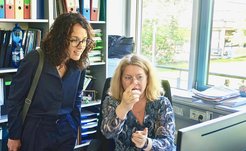Hesse's Science Minister Angela Dorn visits the Max Planck Institute for Terrestrial Microbiology
On May 29, Angela Dorn, Hessian Minister of State for Science and the Arts, and Dr. Ulrike Mattig, Head of Department for Non-University Research Institutions, visited the Max Planck Institute for Terrestrial Microbiology at the Lahnberge in Marburg.

What do encounters between politics and scientific institutions have in common with nature? In the beginning, there were microorganisms. Managing director Prof. Victor Sourjik gave a short overview of the scientist´s often invisible but highly powerful objects of research. In the following presentation of the Institute's scientific objectives by Prof. Tobias Erb, it became clear that microbiological basic research is more important than ever. Whether in the field of environmental protection, climate change, or human, plant and animal health, microbial biochemistry and interactions play a key role in the future answers to the present challenges to society.
Angela Dorn was particularly impressed by the high level of internationality and continuous development of the Institute. As the Max-Planck Directors emphasized, internationality, but also the close cooperation with the University of Marburg, the LOEWE SYNMIKRO research center and the local companies in Marburg is the ground on which excellence thrives – and that fundamental scientific process takes years. Especially the promotion of young talents is immensely important in order to guarantee the institute`s top-level research. All those present agreed that innovation needs scientific freedom, but also support among the population. „The people ought to have confidence in scientific research, because scientific knowledge is the foundation of our thinking - and our solutions “, according to the minister. The presentations were followed by a lively discussion of scientific, but also political-social aspects and future projects.

In the concluding tour of the institute, Angela Dorn first visited the greenhouse of the Department of Organismic Interactions on the building`s top floor. Finally, Dr. Anke Treuner-Lange from the Department of Ecophysiology proved that a minister really can gain exciting insight into electron microscopy and the technical-analytical possibilities of the institute even in just ten crisp, short minutes.













